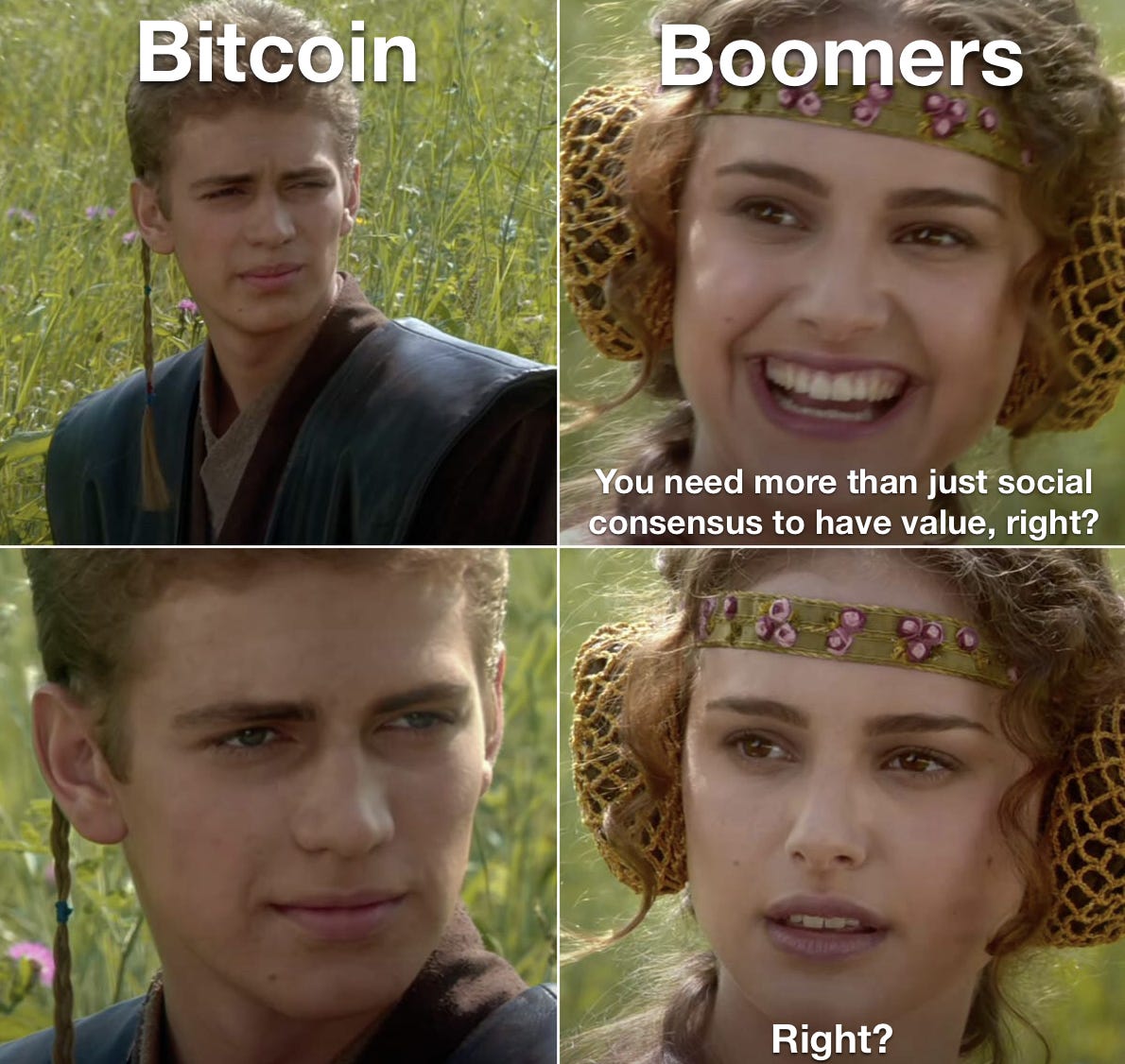How the DeFi Blueprint Aligns Market Incentives with Societal Values
By Sam McCarthy
*Part 2 of a 2 part essay series on the current state of decentralized governance in crypto. This essay follows “Make Decentralized Governance Great (Again?).”
Decentralized governance implemented through DAOs encourages open participation in the development of the DeFi industry. By either purchasing or earning governance tokens, actors not only have the opportunity to share in the risk and reward associated with the monetization of a new financial system, but also the incentive to define the economic and social impact that system will have. Ideally, you purchase a governance token because you like the project and begin sharing ideas to make its token price go up. These tokens represent not only a financial stake in the protocol, but also membership in a community, the ability to influence the protocol, and a track record of participation.
Many cryptoassets today, particularly those within DeFi, also grant holders claims on a portion of protocol cash flows. This gives the tokens very quantifiable value, which can even be modeled by discounted cash flow analyses favored by traditional financial institutions. However, this has left many to wonder whether "pure" governance tokens, which only carry rights to partake in protocol governance, are valueless.
In this essay, I introduce three theoretical perspectives from which we can view the term "value" and how they relate to cryptoassets. In addition, I discuss how the power granted by governance tokens confers value. Lastly, I propose governance power as a new fundamental metric in token valuation that can be measured by a "governance premium" assigned to a token's price.
THREE INTERPRETATIONS OF VALUE (& NFT MANIA)
The word "value" can refer to the price or meaning of something, or more generally, to that which is morally cherished. As a result of this ambiguity, in his book, Toward an Anthropological Theory of Value, David Graeber presents three interrelated schools of thought around value: economic, sociological, and linguistic.

Economically, an object's value is measured by what others are willing to give up, or exchange, to get it. This implies that value is determined by buyers in a marketplace. For example, as the non-fungible token (NFT) market rapidly expands, investors and speculators are currently rushing to outbid each other for new and artificially rare pieces. Right now, the value of some of these collections, such as CryptoPunks and EtherRock, have exploded because buyers are willing, and able, to pay elevated prices for them. However, this is not the only factor that determines the value of a particular NFT.
Graeber describes sociological value as the "conception of what is ultimately good, proper, or desirable in human life." Valuing something through this lens involves identifying the benefits an action or object holds within a greater social context. Corresponding to René Girard's concept of mimetic desire, this definition of value implies that others influence the choices we make regarding not just what we want, but what we ought to want. Similar to traditional art, NFTs grant holders status and reputation. Likewise, a collection of prominent individuals (crypto-native investors and influencers) signal the desirability of these assets. By "shilling" certain NFTs, these individuals influence the preferences of others and the status attributed to individual pieces and collections. The digital commons of the Internet only amplifies the effect this has on an NFT's perceived value and price.
Lastly, the linguistic value of objects is measured by the differences between them. Ferdinand de Saussure, the pioneer of semiotics, claimed that in order to understand the meaning of a word, one must understand its place within a larger system. The definition of the word "red," for example, is best understood as the color that isn't blue, green, or yellow. In this sense, to value NFTs you must understand their place within their collection (based on characteristics and rarity), as well as with the entire universe of NFTs (based on age, owners, and meaning within the larger crypto ecosystem). No NFT can be valued in isolation.
SOCIAL CONSENSUS
Through the lens of all three interpretations of value, we can draw a simple conclusion: actions and objects become meaningful (or valuable) to humans by being incorporated into a social system. Graeber states, "The realization of value is always, necessarily, a process of comparison; for this reason it always, necessarily, implies an at least imagined audience." For us, the "imagined audience" is society.
When measuring an object's value, not only do we try to determine what others might be willing to exchange for it, but we consider what others agree it is worth within a social context. The result is that social consensus becomes the fundamental source of value; something has value if people agree that it has value. Viewed in parallel with traditional microeconomic theory, a consumer's utility is maximized when purchasing a good with the highest level of agree-upon social value.
This phenomenon is particularly apparent with bitcoin. In one of my favorite essay's on the subject, pseudonymous crypto researcher Hasu states, "The bitcoin token itself has no value. The value exists purely on the social layer." While blockchain technology adds credibility through programming and automation, the social layer determines the rules of bitcoin the blockchain, which ultimately gives bitcoin the cryptoasset its value. For this reason, you cannot replicate bitcoin by just "forking" its code. In order for the forked protocol to have any value, you have to obtain the buy-in of the community of people that underwrite its value. Hasu likens this process to running a presidential campaign as a financial investment.

For a variety of reasons, changing the ruleset of and exercising control over a DeFi protocol is far simpler than recreating bitcoin. And, as we will see, there are more definitive metrics to measure the value generated by exercising this power.
POWER AND INFLUENCE
Standing in opposition to legacy finance and internet companies, where control remains in the hands of the few, open digital communities assume direction of DeFi protocols. Each community leverages its own decentralized governance processes, which occur both on-chain (for more formal, binding changes) and off-chain (for voting, as well as discussion and sentiment checks). Ideas of all community members are evaluated in order to arrive at consensus regarding protocol execution and capital management. This bottoms-up approach allows projects to address and fund the most important initiatives as defined by the collective group of users, developers, and tokenholders.
While I do not believe the only, or even the best, mechanism to implement decentralized governance process is through a one-token-one-vote scheme, I do believe that the token model is effective at translating social values into economic outcomes. In "A Blank Slate of State," Chris Burniske states, "Protocols allow us to more granularly coordinate around social ideals, while still using the tool of free markets and competition to drive those outcomes." Tokens carrying governance rights allow people to freely express their ideas and beliefs by contributing to and voting on community proposals in an open forum. As a result, protocol resource allocation reflects the collective values of the many rather than the opaque motivations of the few. The most successful projects will inevitably be those that leverage the full functionality of this new asset class to produce products and services that generate the most utility for the widest set of stakeholders.
In "Cryptonetwork Governance As Capital," Placeholder partner Joel Monegro defines governance as the power to change the rules of cryptoeconomic networks. For DeFi, the value of governance lies within this power - the power to influence the evolution of a new financial system, define the impact it will have on society, and accrue the associated status and reputation. All of this represents great value for individual actors within a wider social context. Thus, the right to exercise a certain level of control within DeFi, as represented by governance tokens, accrues monetary value in proportion to the perceived social value of participation.
THE GOVERNANCE PREMIUM
In traditional finance, various types of premiums are added onto an asset's "intrinsic value" to reflect some amount of future uncertainty. For example, a liquidity premium is added onto the value of relatively illiquid assets to compensate the buyer for the possibility that the asset cannot be easily resold for cash at fair market value. Keeping with this type of valuation model, I present a new type of premium: the governance premium.
The governance premium equals the value of open participation in protocol governance and reflects the degree of perceived control an investor has over a project's future. Unlike other financial premiums, a governance premium is inversely related to uncertainty. The greater the perceived control granted by the token (and therefore, the less perceived uncertainty over the future of the protocol), the greater the governance premium added to the value of the token. Like all things crypto, the governance premium is set in the market.
There are three primary variables to consider while analyzing governance premiums: project growth, "assets under management" (AUM), and community strength.
GROWTH
As a nation state grows in international prominence, so does the power of its leaders. Equivalently, as a protocol becomes more systemically important, the impact of wielding power over the protocol increases. This also applies to the reputation, status, and feeling of purpose that comes from participating and having value-added contributions within the protocol's community.
AUM
A DeFi project's "AUM" include its treasury and the total value locked (TVL) in its smart contracts. Treasury spending and resource allocation is usually determined through the project's governance proposal, discussion, and voting process. This can directly impact the tokenholders by voting in revenue-sharing cash flows. In addition, this can impact the owners of the assets locked in a project's contracts by changing key protocol parameters. As AUM increases, so does the value of capital controlled by governance participants, as well as the social consequences of that control.
COMMUNITY
The most important factor is community, which includes developers, users, and tokenholders. Cultivating a strong community is essential for any DeFi project. To do this, it is necessary to promote the legitimacy of the project's governance process by engaging the community and increasing their perceived control over the protocol. This makes members more motivated to contribute and the project more resistant to plutocracy (i.e. rule by "whales"). The strength of a community can be measured in various ways, including the level of its active participation and the effectiveness of its collective action.

The governance premium reflects the fact that the power to participate in a community within a growing industry, power which impacts an ever broader set of stakeholders, confers value greater than that which is purely economic. We must ask ourselves then, how should we use this power? How do we leverage this opportunity to create a more open Internet, a more inclusive financial system, and a more innovative society?
CONCLUSION
Through Graeber's analysis, we are able to understand that value is created within society's conception of the desirable. The problem then becomes how to efficiently aggregate many individual ideas of what is valuable in a way that directs collective action towards the most beneficial ends for the largest number of people. In modern economies built on neoliberal ideology, the all-powerful "free market" is supposed to serve this purpose. However, corporate capitalism has led to monopolistic power, inefficient resource allocation, and rampant inequality. Status and power is based on the capital you have, not on the value you add. Thus, the majority of people's voices are not heard, nor their needs met. Furthermore, the financial services industry, which should be responsible for funding and providing liquidity for projects that will benefit all of society, instead enriches a small group of executives, shareholders, and wealthy individuals. I believe DeFi and the rest of the cryptoeconomy offer a promising alternative.
In Web3's vision of an open Internet, governance is the way digital communities, including DeFi protocol DAOs, signal what they consider desirable. Through the activities they incentivize and the projects they fund, community members shape the industry's future. As the ecosystem grows, these decisions have a greater and greater impact upon society. In addition to accruing value to tokens, all actors within the crypto space should recognize that this power comes with responsibility.
As the witnesses to the founding of an entirely new economic and social order - a new way to organize, coordinate, and innovate - we must ensure that it is built in a way that will benefit the most amount of people. Burniske warns, "Markets are a powerful technology that is meant to serve society's virtues, but markets are dangerous as a virtue system in-and-of themselves. If we continue to allow markets to dictate our virtues, we will perpetuate a society that the majority now whisper is selfish, divisive, imbalanced - threatening, even." With everything in our world currently abstracted behind a veil of money and profit, we must regain the social context of our actions and recognize the value derived from them.
My hope is that in our current paradigm where capital is abundant and people pay millions of dollars for JPEGs of rocks, social value - as measured by the impact our actions have within a larger system - will displace monetary value as the primary pursuit of economic actors. As Burniske states, "The opportunity to craft the future we want to see is always ours." Let's ensure that as we embark on our journey deeper into the Digital Age, that future remains bright.
